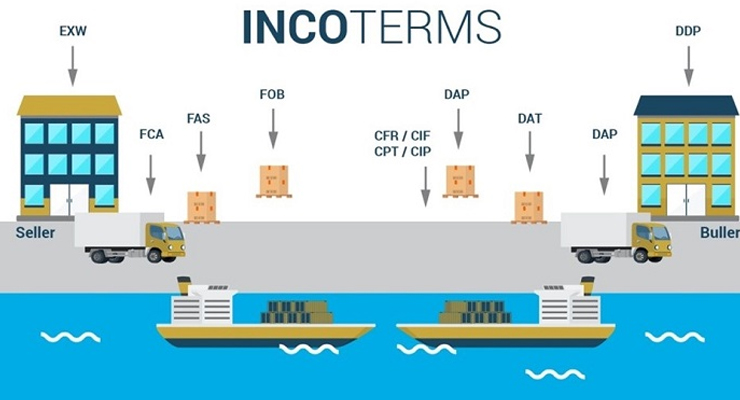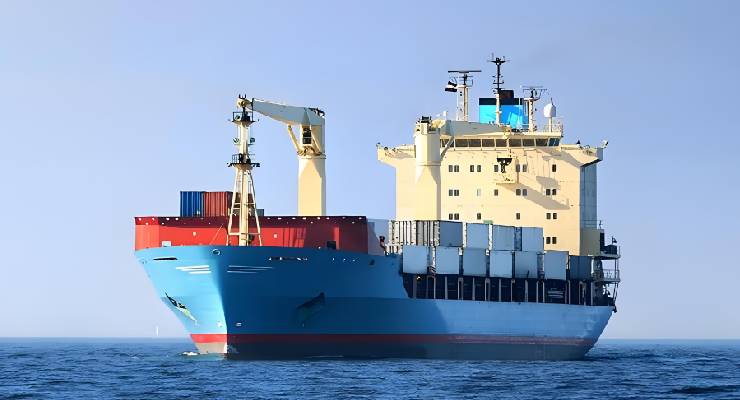
Not all Incoterms are valid for all types of shipments. While all Incoterms are valid for waterway shipments, some can only be used for waterway transport, and
not land or air. Knowing these differences can be crucial, because if you use a waterway only Incoterm and ship using an alternative method, you may find
yourself needing to cover additional, unexpected charges.
Below is a list of Incoterms you can use for all types of shipment methods;
EXW – Ex Works or Ex-Warehouse
FCA – Free Carrier
CPT – Carriage Paid To
CIP – Carriage and Insurance Paid To
DAP – Delivered At Place
DPU – Delivered At Place Unloaded
DDP – Delivered Duty Paid
Below are Incoterms you can only use for sea and inland waterway transport:
FAS – Free Alongside Ship
FOB – Free on Board
CFR – Cost and Freight
CIF – Cost, Insurance Freight
What is the difference between ‘Freight Collect’ and ‘Freight Prepaid’?
Freight Prepaid and Freight Collect are terms that can commonly be used between buyers and sellers when discussing international freight. When a seller
mentions ‘Freight Collect’, they refer to one of the four Incoterms that require the buyer to collect and pay all freight charges. The Incoterms associated with
Freight Collect are:
EXW – Ex Works or Ex-Warehouse
FCA – Free Carrier
FAS – Free Alongside Ship
FOB – Free on Board
Freight Prepaid indicates the seller will pay for the freight charges. The remaining seven Incoterms consist of Freight Prepaid:
CFR – Cost and Freight
CIF – Cost, Insurance & Freight
CPT – Carriage Paid To
CIP – Carriage and Insurance Paid To
DAP – Delivered At Place
DPU – Delivered At Place Unloaded
DDP – Delivered Duty Paid
What types of insurance is a seller required to obtain when shipping under CIF and CIP Incoterms?
Two International Commercial Trade Terms require the seller to purchase insurance on the cargo prior to shipment. These two terms are CIF and CIP. Each of
these terms has unique requirements for the type of insurance a seller must obtain.
CIF, or Cost, Insurance & Freight requires an insurance policy with the minimum cover of the Institute Cargo Clause (C).CIP, or Carriage & Insurance Paid To
requires an insurance policy with a minimum cover of the Institute Cargo Clause (A).
How do a buyer and seller agree on which Incoterm to use?
Unless specifically requested by a buyer, sellers often have preferred Incoterms they use that work best for them and their customers. Buyers can often have
unique preferences, which are conveyed to sellers, and through this communication, a buyer and seller can come to an agreement on the most ideal Incoterm
for their deal.
In order for Incoterms to be contractually valid, the terms should be listed on the purchase agreement, sales invoice, or sales contract. As these are
contractual terms, buyers and sellers should be clear with their agreement and not rely on verbal communication to define the responsibility of each party
when shipping products internationally.
There is no special documentation or form needed when selecting an Incoterm; instead, the term should be listed in conjunction with the product price and
defined as the agreed-upon incoterm.
Incoterms can change during an order process. For example, if a shipment was intended for sea, but due to delays or unforeseen circumstances, the
shipment needs to be shipped via air, an Incoterm could change. As we discussed above, not all terms are valid for air travel. If there is a change in the terms,
buyers and sellers would need to communicate this change, just as they would communicate any other change taking place in a purchase agreement.
-
 A Comprehensive Guide to Refrigerated ContainersJun 17,2025
A Comprehensive Guide to Refrigerated ContainersJun 17,2025 -
 Guide to 20ft & 40ft Shipping Container Dimensions for Global LogisticsJun 17,2025
Guide to 20ft & 40ft Shipping Container Dimensions for Global LogisticsJun 17,2025 -
 How to track shipments sent from ChinaMay 13,2025
How to track shipments sent from ChinaMay 13,2025 -
 Guide to Importing and Shipping Cars from China to UAEMay 13,2025
Guide to Importing and Shipping Cars from China to UAEMay 13,2025 -
 Guide to Importing and Shipping Camping Gear from ChinaMay 07,2025
Guide to Importing and Shipping Camping Gear from ChinaMay 07,2025 -
 Shipping from China to YemenMay 06,2025
Shipping from China to YemenMay 06,2025

